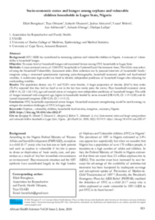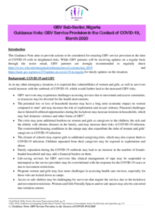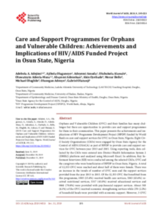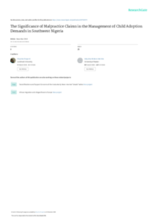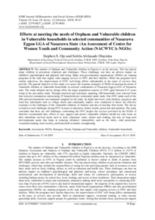childrens_living_arrangement
Displaying 41 - 50 of 136
The purpose of this study from the journal of African Health Sciences was to assess the level of household hunger and associated factors among orphans and vulnerable children (OVC) households in Lagos State, Nigeria.
"The lockdown measures have increased the risk of children [in Nigeria] becoming victims of domestic violence, bullying and other forms of abuse," says Rev Ifeanyi Mbaegbu in this article.
This article from BBC News describes the movement of children and young people in Nigeria from Koranic schools back to their homes during the COVID-19 crisis, "one of the biggest ever state organised mass movements of minors in Africa's most-populous state."
This Guidance Note aims to provide actions to be considered for ensuring gender-based violence (GBV) service provision in the time of COVID-19 with its heightened risks.
Vulnerable children and families need a strong social support network that acts as a safety net to effectively and sustainably respond to the situation of children and families at risk.
This paper presents the achievements and implications of HIV Programme Development Project (HPDP) funded by World Bank on care and support services for OVC in Osun State, Nigeria.
This study investigated the exactitude of claims on the existence of corrupt practices and systemic vulnerabilities within the child adoption domains in Nigeria.
The general objective of this study is to assess the response strategies of NGOs in meeting the needs of vulnerable children in vulnerable households in selected communities of Nasarawa Eggon LGA of Nasarawa state, Nigeria.
This paper examines all policy and laws related to families in the South, West, East and Central regions of sub-Saharan Africa.
The special issue of Emerging Adulthood titled “Care-Leaving in Africa” is the first collection of essays on care-leaving by African scholars. This article, coauthored by scholars from North and South, argues in favor of North–South dialogue but highlights several challenges inherent in this, including the indigenizing and thus marginalizing of African experience and scholarship and divergent constructions of key social concepts.

